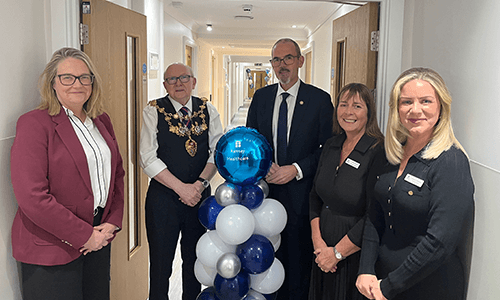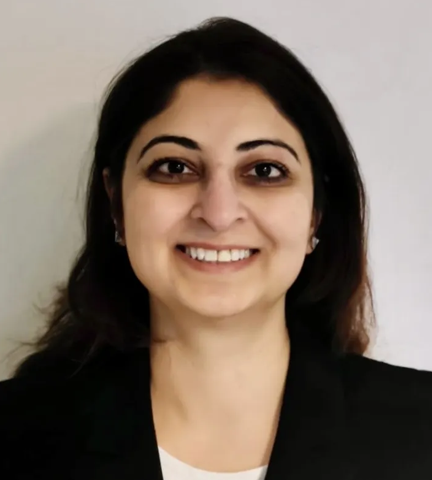Shoulder replacement surgery (also called shoulder arthroplasty) is an operation where the damaged parts of your shoulder joint are replaced with artificial components.
It’s usually recommended when severe pain, stiffness, or loss of movement in the shoulder no longer responds to other treatments.
Although it’s a major procedure, most patients notice a big improvement in pain and function. Most people return to light daily activities within six weeks, with full recovery taking several months to a year.
Here, we’ll explain what shoulder replacement surgery involves, outline timelines for recovery, and show you what you can expect when choosing Ramsay Health Care.
What is total shoulder replacement?
Your shoulder is a ball-and-socket joint, where the rounded top of your arm bone (humeral head, or “ball”) fits into a shallow socket in your shoulder blade (scapula). Damage to this joint can make even simple movements painful and difficult.
In a total shoulder replacement, the damaged ball is replaced with a smooth metal prosthesis, and the socket surface is lined with durable plastic. If necessary, surrounding tissues may also be repaired or replaced. This effectively gives you a new shoulder joint designed to restore smoother, pain-free movement.
What does shoulder replacement surgery treat?
Shoulder replacement surgery may be recommended if shoulder pain and stiffness are severe, limit your daily activities, and haven’t improved with other treatments, such as physiotherapy, medication, or injections.
Shoulder replacement surgery is most often used to treat:
- Osteoarthritis: Wear-and-tear damage to the shoulder joint, causing pain and stiffness
- Rheumatoid arthritis and other inflammatory disorders: Conditions such as rheumatoid arthritis, psoriatic arthritis, lupus, gout, and ankylosing spondylitis can damage cartilage and bone in the shoulder.
- Severe rotator cuff damage: The rotator cuff is a group of muscles and tendons that surround the shoulder joint and allow you to rotate it. If the rotator cuff is severely damaged and the underlying cartilage or bone is affected, a total shoulder replacement may be required.
- Complex fractures: Bone breaks in the humeral head (ball of the joint) and the upper end of the arm bone that holds the head (humerus) that can’t be repaired with pins or plates may require a shoulder replacement.
- Frozen shoulder or bone spurs (osteophytes): In rare cases, conditions such as frozen shoulder or bone spurs may lead to a shoulder replacement, particularly if they cause long-term pain or disability and other treatments haven’t worked.
- Avascular necrosis: Loss of blood supply to the shoulder bones, leading to bone collapse.
How to prepare for shoulder replacement surgery
Before your shoulder replacement operation, your Ramsay Health Care team will carry out a full assessment of your shoulder. This typically includes a physical examination and may involve imaging tests, such as X-rays, ultrasounds, or MRI scans, to better understand the extent of the damage.
You’ll receive detailed guidance on how to prepare, which typically includes:
- Avoiding food and drink for several hours before surgery.
- Stopping certain medications beforehand, such as blood thinners, if advised.
- Showering or bathing with unperfumed soap the evening before or morning of surgery.
- Wearing loose, comfortable clothing on the day.
- Arranging for someone to drive you home after your shoulder surgery.
You can read more about what to expect before and during your stay with Ramsay Health Care.
What does total shoulder replacement involve?
Shoulder replacement surgery at Ramsay is carried out by an orthopaedic surgeon specialising in shoulder procedures. The operation is usually performed under general anaesthetic and typically takes around two hours.
Once you’re in the operating theatre and anaesthetised, your surgeon will:
- Make an incision (cut) at the front of your shoulder to access the joint.
- Carefully remove the damaged “ball” of the joint (humeral head) and any affected socket tissue.
- Prepare the bone surfaces to accept the prosthetic components. A highly polished metal ball is fixed in place using bone cement or implants designed to encourage bone growth.
- Fit a durable plastic lining into the socket to create a smooth new surface.
- Close the incision with stitches (removed after about two weeks) and dress your shoulder with bandages.
Are there alternatives to a total shoulder replacement?
Most people are only advised to have a total shoulder replacement when other treatments, such as physiotherapy, medication, steroid injections, or shoulder arthroscopy, haven’t improved symptoms.
In some cases, alternative shoulder surgery options may be considered, including:
- A partial shoulder replacement (hemi-replacement): Only the ball of the shoulder joint is replaced, leaving the socket intact.
- Shoulder resurfacing: A metal covering or “cap” is placed over the surface of the ball instead of replacing the whole joint.
Your consultant will explain all the treatment options available and recommend the approach best suited to your needs.
Shoulder replacement aftercare
After your shoulder replacement surgery, you’ll be taken to a recovery area as the anaesthetic wears off. Most patients stay in the hospital for one to four days, depending on their overall health and the specifics of the operation.
Before you go home, your Ramsay team will explain how to:
- Care for your surgical site
- Manage pain and swelling
- Find comfortable positions for sleeping
- Begin gentle movement and rehabilitation exercises
We’ll also arrange follow-up appointments with you to monitor your healing.
Our physiotherapists will work closely with you, providing a progressive exercise plan tailored to your needs. This helps speed recovery and ensures you regain maximum movement, strength, and mobility.
Shoulder replacement recovery
The speed of recovery from shoulder replacement surgery varies between patients, depending on factors such as age, overall health, type of surgery, and following the rehabilitation plan.
Here is a general guide to what you can expect after shoulder replacement surgery:
First 1–2 weeks after shoulder replacement surgery
Pain and swelling usually peak during this stage, but medication will help manage this.
You’ll likely keep your arm in a sling as much as possible to limit movement and protect the new joint.
Your focus will be on rest, wound care, and avoiding unnecessary strain on your shoulder.
Gentle physiotherapy exercises often begin early to prevent stiffness.
3–6 weeks after shoulder replacement surgery
Pain levels begin to reduce, with many patients already noticing less discomfort than before surgery.
You may still use a sling for part of the day but should gradually be able to manage light daily activities, such as dressing and simple household tasks.
Physiotherapy will focus on safely increasing your shoulder’s range of motion.
7–12 weeks after shoulder replacement surgery
By this stage, pain and sleep are generally much better.
Many people are cleared to drive again and can return to desk-based work.
Physiotherapy becomes more active, focusing on rebuilding strength as well as flexibility.
3–6 months after shoulder replacement surgery
During this period, your shoulder function should be much improved, with greater strength and mobility.
You may be able to return to a wider range of everyday activities, such as swimming, gardening, or light sports, depending on your progress.
Some residual stiffness or weakness may persist, but daily life is usually much easier.
6–12 months after shoulder replacement surgery
By around six months, most patients experience significant pain relief and improved joint function, though full recovery from a shoulder replacement can continue for up to a year.
Many people return to most of the activities they enjoyed before surgery, although heavy lifting, repetitive overhead use, and contact sports may remain restricted.
With ongoing exercise and physiotherapy, your new shoulder joint should continue to strengthen and improve.
What are the benefits of total shoulder replacement?
Most people who undergo shoulder replacement enjoy a major improvement in their quality of life.
Once recovery is complete, you can expect relief from pain and stiffness, better mobility and strength, and the ability to return to everyday activities and hobbies that were previously too difficult.
Potential risks and complications of total shoulder replacement surgery
Most patients recover from a shoulder replacement operation without any problems. However, as with any major surgery, there are some risks. Complications are uncommon, but may include:
- A reaction to the anaesthetic
- Infection of the wound site or joint
- Excessive bleeding
- Blood clots (deep vein thrombosis)
- Scarring
- Injury to surrounding nerves or blood vessels
- Small bone cracks or fractures during surgery
- Shoulder instability, where the ball of the joint moves out of its socket
- Loosening, dislocation, or wear of the artificial joint over time.
Modern shoulder replacements typically last 10-15 years or more, and revision surgery is possible if needed. Your Ramsay surgical team will discuss these risks with you and take every precaution to minimise them.
The cost of total shoulder replacement surgery
The exact cost of shoulder replacement surgery can vary depending on factors such as your treatment plan and the type of procedure required.
At Ramsay Health Care, we offer a range of clear and flexible options for payment. If you choose to self-fund, our all-inclusive Total Care package provides everything you need for a single, pre-agreed price. This one-off payment covers your hospital stay, surgery, and aftercare, giving you complete reassurance and no hidden costs. Flexible finance options are also available (subject to status) so you can spread the cost in a way that works for you.
If you have private medical insurance, your shoulder replacement surgery may be covered by your insurance policy. We recommend checking the details with your insurance provider and requesting written confirmation before starting treatment with us.
Total shoulder replacement with Ramsay
When you choose Ramsay Health Care, you’ll receive expert treatment delivered in a modern, comfortable setting.
Your shoulder replacement operation will be carried out by an experienced consultant orthopaedic surgeon specialising in shoulder surgery, at a Ramsay hospital convenient to you.
Our dedicated team of nurses and physiotherapists will provide tailored aftercare and a rehabilitation plan designed to support your recovery and help you get back to the activities you enjoy.
Get in touch today to book an appointment and find out how we can help.
Total shoulder replacement surgery FAQs


